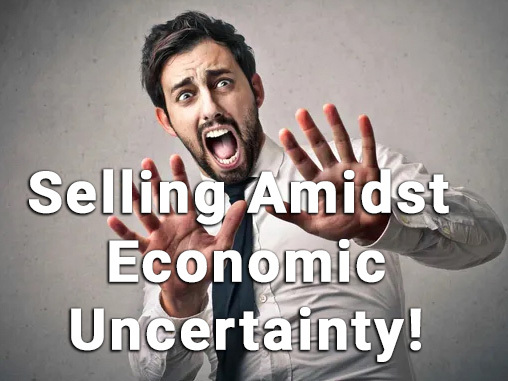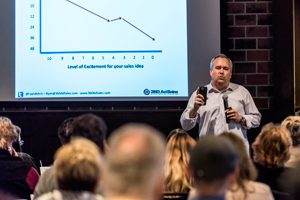Selling During Times of Economic Uncertainty

Selling During Times of Economic Uncertainty
There’s so much going on out in the world—so much economic uncertainty and insecurity right now. So this blog is going to get you pumped up and ahead of the storm we are selling through yet again. It’s not like we haven’t been here before.
Economic uncertainty means different things to different people, of course. But rather than talk politics, let’s just talk in general about economic uncertainty and how it’s impacting our customers right now—and how we will potentially sell to them.
In that vein, there are three key things we must be able to do to survive and thrive through this latest wave of economic uncertainty.
Podcast on this topic: https://360adsales.com/ad-sales-training-podcast/
No. 1: Get Ahead of the Storm
For me, getting ahead of the storm is about controlling the narrative. If you control the narrative, your clients will be hearing what you’re saying and what you want them to hear. Unfortunately, according to Adrian Brody, a professor at Wake Forest University, humans are hardwired to dismiss facts that don’t fit their viewpoint. Ok then, let’s not debate facts, but let’s just talk about it.
Here’s the reality: People are nervous out there right now. Business owners are nervous out there right now.
So, when you think about getting ahead of the storm and controlling the narrative, it’s about you being positive, and about you controlling the messaging that you want about your company to get in front of your potential clients.
What I tend to do during times of economic uncertainty is just get on the phone. Talk to your customers. Understand where they’re coming from. Walk a day in their shoes. Understanding what they’re experiencing is so very, very important.
But what’s even more important is providing these potential clients with social proof. Social proof is you mentioning to them that they are not alone—and that other businesses like theirs are keeping on keeping on. Now, I’m not saying that’s true in every circumstance, but you have customers, advertisers, clients that are continuing on with their marketing or business. And so social proof is about you ethically name-dropping other businesses, as much as you can talk about it, that are staying the course and continuing to invest in tech, advertising, and other growth initiatives.
Now remember, typically, businesses that keep on keeping on during times of uncertainty are the ones that tend to exit a recession or pull through the pandemic doing better than if they’d battened down the hatches, pulled back, and done nothing.
So, get out ahead of the storm and help your clients get out there too.
No. 2: You Must Sell Value
This is true no matter what it is that you’re selling. So you need to focus on the now and the value a client receives from doing business with you. How can you impact somebody right now? When times get tough, our clients and prospects tend to get tunnel vision. They get very narrow in their focus. Price is what someone pays. Value is what they get. What you’ll see with a great deal of the products or marketing or other goods being sold out there is that the focus seems really about the impact that’s going to happen six months from now. That is just too far ahead for most people right now. They can barely handle the now, much less the thoughts of the future. Let’s sell how we can help them right now. Live with them in this moment. How can our product or service impact them right now? And we need to do that by separating ourselves, differentiating ourselves. So I ask, what is your differentiating factor? I like to call it my “D” factor. What’s your differentiating factor, personally? What is something that you, your business, or your service does that’s different and how will it fix things now?
And remember, it needs to be beyond you. Of course, you’re different—we’re all different. But the point is, it has to be something that differentiates you and your selling from everybody else.
The reason this is important is because, especially in the marketing business where a lot of my friends and fans live, if there are two companies that are advertising right now and each one has set their volume level to 10, if one of those companies changes their volume level down to five, the other company is simply louder right on the spot. It’s what I call the Law of Being Loud. And the Law of Being Loud is that if two people are in a room and both are talking at a volume of 10, then one of them starts talking at a volume of 5, the one that’s at 10 doesn’t need to get any louder to be heard. By nature of the speaker going from a volume level of 10 down to a level 5 volume, the other speaker just seems louder—without having to change what they’re doing at all.
It’s sort of like when you’ve been in a crowd of people and you were talking at a normal volume to a friend, and then all of sudden the room got quiet for a minute and what you were saying sounded REALLY loud. That’s the Law of Being Loud.
So, for those of you listening who are in the marketing business, whenever an advertiser says, “We’re just going to turn the volume down a little bit,” you can tell them that by turning your volume down a bit, your competitor doesn’t have to do anything whatsoever to sound louder and draw the attention.
Podcast on this topic: https://360adsales.com/ad-sales-training-podcast/
No. 3: Step up your game. Step up your activity.
When things are getting bad out there, you need to step up your game. You need to get on the phone a lot more. You need to be positioning yourself as a thought leader. You need to be going on LinkedIn, polishing up your profile, following your clients, commenting and liking. Then following your clients’ companies and commenting on things and liking. Following them on Instagram, Facebook, etc. Commenting. Sharing. Liking.
During a time of economic uncertainty, people need to feel like someone’s looking out for them. And guess who that person is? That would be you, reading this. Because If every outreach you have with your customers is a sales outreach, then you’re just a salesperson.
But as a salesperson I want to position myself as a helper. As a trusted advisor. Because if you’re just a salesperson, you’re a salesperson like everybody else. So consider, are you in sales or you out there to advise and help people?
I’ve decided I’m there to help and advise people. So 50% of my outreaches to my current clients are typically retention-based, non-sales outreaches. I also realize that simply reaching out is not a differentiating factor, so please keep that in mind. Because, remember, customer service is expected. And everybody supplies it to one degree or another, so it’s not typically a differentiating factor. True differentiating factors are all the things you do better or differently, beyond great customer service.
Here are some examples that can help you develop a true differentiating factor. First, get personal with people during times of economic uncertainty. Stop all the mass emails; nobody reads mass emails anymore. Email really only works today when you give it a personalized approach.
In other words, grow your brand. Get personal with your outreach. Step up your activity. Maybe consider this question: “What am I going to do to grow 22 customers in 2022?” You could start with something along those lines.
So, here’s a quick recap. First and foremost, I want you to think about getting ahead of the storm. That means controlling the narrative, getting on the phone, providing a lot of social proof.
And the second thing: sell value. Focus on the now and share your newly identified differentiator, or “D” factor. Remember, too, the Law of Being Loud. It’s important here and you can use its example to help your customers understand why it’s important to preserve a strong presence in the market and not to let their volume slide.
And then third, step up your activity. Specifically your non-sales activities—beyond customer service. Get personal with customers and prospects. Stop the mass emails. Be very relevant and very specific with them. And then on LinkedIn, work to truly grow your brand.
To wrap up, it’s what I end every blog and every podcast with—if sales was easy, friends, everybody would be doing it. We lived through the recession of 2006-2008, and we survived. Some of us even thrived throughout the pandemic. And now we’re going through another time of economic uncertainty. But here’s the deal: we will survive.
My first book was written in 2008, right after the Great Recession. This next book, Selling Forward, was written just after the pandemic, so it’s well-positioned right now to help you really get ahead of the storm. So read the book. Use it.
You can find Selling Forward on Amazon, Audible, and Kindle. And your purchase will help me help you help others—because a portion of the proceeds are slated for charities.
Podcast on this topic: https://360adsales.com/ad-sales-training-podcast/
Buy the book on this topic: https://www.amazon.com/~/e/B0B3Q1NK4C
Until next time!



